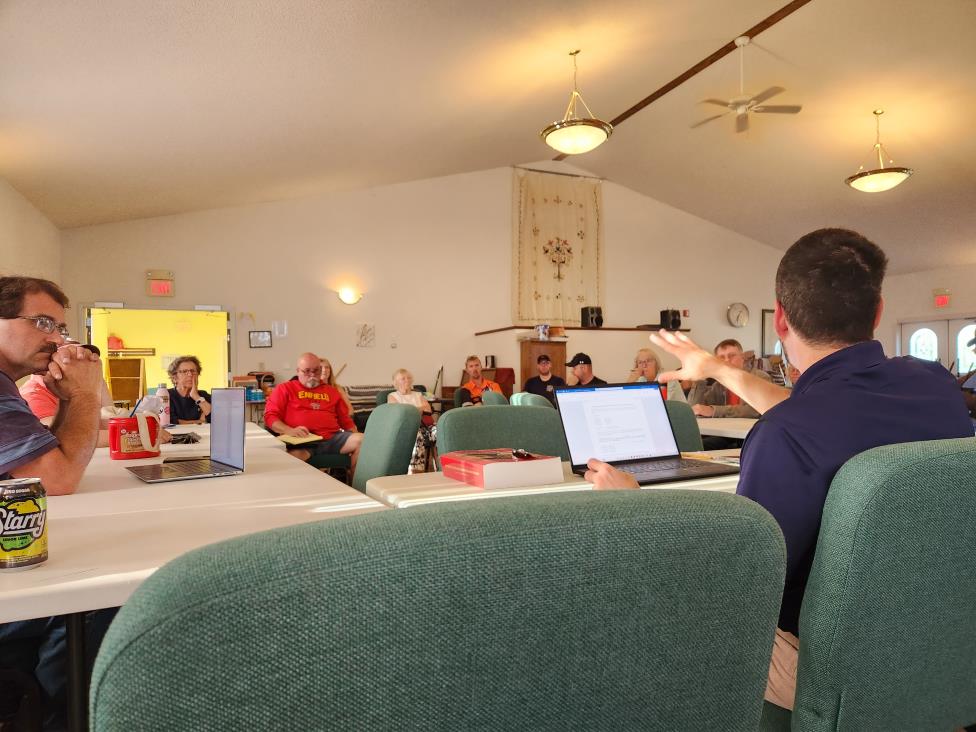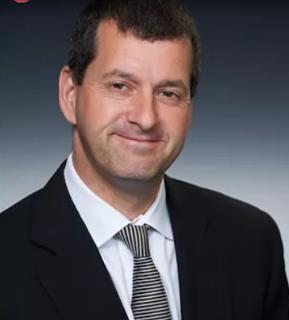Money matters dominate first Fire Commissioners huddle
by Robert Lynch, August 1, 2023
In the eyes of the law, it never happened. But of course, it did.
For an hour and 50 minutes Tuesday, the five people the Enfield Town Board tentatively chose last month to populate its newly-created Fire District’s Board of Commissioners met together for the first time. They convened along with a score of onlookers—most of them Fire Company volunteers—as well as two Town Board members and the attorney selected to guide the Fire District’s formation.

“This is not a meeting of the Fire District. This is not a public meeting,” lawyer-specialist Brad Pinsky said at the meeting’s outset. “There of lots of almost-decisions to be made tonight,” Pinsky said. The attorney expects those “almost decisions” to become official in just about a week, as soon as the Commissioner designees become more than just placeholders on a Town Board wish list.
Though the Enfield Town Board voted in mid-June to change from a Town-administered “Fire Protection District” to a “Fire District,” a legal entity governed by the Board of Fire Commissioners; and even though the Town Board announced its Fire Commissioner choices following an executive session July 12th, the Town Board could not officially appoint the five Commissioner designees until this month. And it chose to delay its official appointment until the Town Board’s regular monthly meeting, August 9th. Until their official appointment, those designees remain powerless to act. And in Pinsky’s opinion, Tuesday’s session at the Enfield Community Building was no more than an unofficial gathering to discuss what lies ahead.
The Town Board’s tentative choice of Town Highway Superintendent Barry ”Buddy” Rollins as one of the five Commissioners had drawn intense public criticism at the close of July’s Town Board meeting. But none of that prior opprobrium spilled into Tuesday’s more recent session. In the past, Rollins has been critical of Fire Company spending. And some volunteer firefighters allege he is hostile to their efforts.
Yet Rollins sat quietly at the corner of the meeting table Tuesday. He asked few questions. And attendees steered their inquiries more toward the Fire District transition’s financial challenges. No one ever addressed the new board’s composition.
“We have a ton of things to do,” Brad Pinsky told the five Commissioner designees and others in the room, as he dominated Tuesday’s discussions. Foremost among the young Fire District’s challenges, he said, will be setting next year’s budget and at the same time asking Enfield’s voters to raise the District’s spending limit above an assessment-driven, state-set ceiling. The current default ceiling won’t even support the fire service’s current budget, let alone future increases.
“This is not an issue to raise taxes,” Pinsky repeatedly drove the point as he urged the new Commissioners to schedule a public referendum as soon as they can—the likely voting date is September 12—to push the Fire District’s Statutory Spending Limit well above what the Fire District could otherwise spend were the limit not increased. No limit applied when the Town Board oversaw the fire service under its Fire Protection District.

If a surprise was to be had meeting night, it was the level to which Pinsky would hike the new spending cap. Whereas without the referendum, state law might cap spending at $200,000 or just a bit higher, Pinsky suggested raising the limit to $400,000 or $450,000. His rationale held that raising the limit once is better than doing it repeatedly and piecemeal.
“It might as well be done once, and leave it for 25 years,” Pinsky stated. Apparently, as the attorney implied, raising a financial ceiling remains good for more than just the current year.
But Town Councilperson Robert Lynch (this writer) questioned Pinsky’s rationale. He countered that raising the limit in “smaller increments,” spread out over several years, might prove “more palatable” to the voters.
Before the discussion ended, Pinsky had backed off his initial idea.
“We don’t have to go out 25 years on the statutory spending limit,” Pinsky said upon further reflection. Maybe we should address the limit over two years, he remarked. “Maybe that’s a better way to do it.”
A second major change in the attorney’s thinking involved how he would handle existing fire apparatus. Enfield’s fire trucks are now owned by the Enfield Volunteer Fire Company (EVFC), a separate non-profit corporation. Without outright ownership, the Board of Fire Commissioners would need to contract with the EVFC and lease the trucks.
Back on June 19th, five days after the Town Board had authorized the current change in fire governance, Pinsky had told the Town Board he’d advise against the Commissioners’ assumption of existing Fire Company debt through the Commission’s purchase of the fire trucks and then converting the EVFC’s bank loans to municipal bonds. Pinsky had earlier suggested just such an action as a money-saving move.
“The loans are at very good rates (4%) and are close to being paid off in the next 3-8 years,” Pinsky had written the Town Board on June 19th. “Therefore, refinancing the loans into bonds would not serve the taxpayer,” he’d maintained.
But Tuesday night, Pinsky did an about-face. He said he now favors bonding for most fire apparatus debt, especially for the Fire Company’s newly-bought pumper truck, priced at more than $800,000. The attorney further posited that it might make sense to roll over other truck loans, nearly paid off, into bonds as well.
“Bonds make sense for the public,” the attorney insisted.
But there’s a catch. The EVFC must play ball. It must agree to sell the Fire District the rolling assets that it already owns. It doesn’t have to. It’s not a certainty. It would demand Commissioner-EVFC negotiation.
Worst-case scenario, Pinsky warned, is if three bad occurrences happen nearly simultaneously: 1) The Fire Company refuses to sell; or 2) The voters reject the new bonding; and/or 3) The voters also refuse to raise the statutory spending limit.
“Either we raise the statutory spending limit, or we bond it.” Pinsky told the meeting. “If all three go down, then we have to dissolve the district,” he warned.
Put another way during the meeting: “Fire trucks alone blow your statutory spending limit out of the water. If we don’t raise the limit, then bye-bye trucks.”
But the message that dominated Tuesday’s meeting was the sense of urgency. Indeed, Councilperson Jude Lemke, the second Town Board member in attendance—Supervisor Stephanie Redmond did not attend—suggested that to make the schedule work best, the Town Board could move up its scheduled August ninth appointment of Commissioners and call a special meeting for a few days sooner.
But more likely, the August 9th appointment date will hold. Instead, as soon as five Commissioners secure Town Board confirmation that night, they’d be sworn in immediately thereafter and whisked down the road to the Enfield Community Center to convene for their own organizational meeting. As each board meets, it would fail to learn what the other is doing.
And even before the members’ own confirmations, Commissioner designees Geoff Hollister and Robyn Wishna have volunteered to meet with Enfield Fire Chief Greg Stevenson and EVFC President Dennis Hubbell to begin next year’s budget discussions.
But those who feared Highway Superintendent Rollins might become the contrarian in the room as a Fire Commissioner found little in Tuesday’s meeting to support their suspicions.
Brad Pinsky at one point asked the five Commissioner designees whether any opposed raising the statutory pending limit. No one, not even Rollins, raised his or her hand.
“I don’t know for sure,” Marcus Gingerich, another Commissioner designee, qualified his position a few moments later. Gingerich admitted he needed to learn more about the issue.
Gingerich and the others will need to decide that crucial question as soon as the night they’re sworn in. A decision on whether to proceed to a referendum could come as soon as next week. Bonding for any apparatus would need to be done by December. A budget must be adopted by November fourth. Much work. So little time to do it.
###

